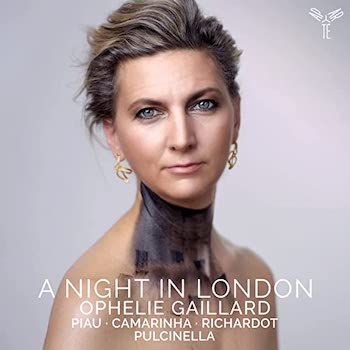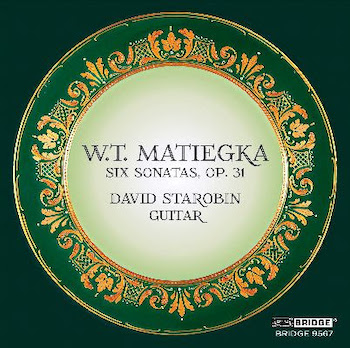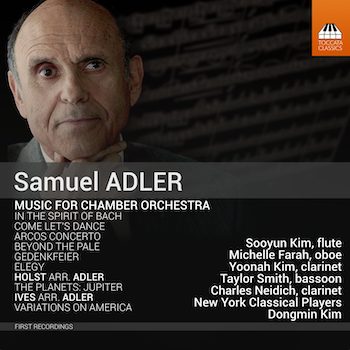“Listening During Covid, Part 10”: So Much Amazing Music to Discover!
By Ralph P. Locke
The record companies are bringing us unsuspected marvels from past and present that we might otherwise never hear, from astonishing Handel-era works and brand-new American pieces to elegantly performed guitar sonatas from 19th Century Vienna.
Click on the following to order, or hear tracks from, the Ophélie Gaillard, Matiegka, or Samuel Adler CDs. Each album is also available on Spotifiy and other streaming services.
I am astounded by many of the recent releases coming from recording companies. The latest delightful batch includes pieces few of us know (or even can have known until now) from three eras: the early to mid eighteenth century (in Italy and the British Isles), the early nineteenth century (in Vienna), and right now here in the US.

Starting chronologically, we have the newest of several recordings that feature the brilliant French cellist Ophélie Gaillard. Here she directs, “from the cello,” a period-instrument orchestra called Pulcinella. Gaillard and Pulcinella bring us works that were, or easily could have been, performed in London during the Baroque and early Classic eras. Most of the composers were resident there at one point, and several of them were themselves cellists.
We hear cello concertos by Nicola Porpora and Giovanni Battista Cirri, shorter pieces by Handel, Hasse, and Geminiani, and some folk songs transcribed and arranged by a fine Scottish composer, James Oswald, who has been getting fresh attention recently (in this ASV Gaudeamus CD and this one on Alpha). The tunes are full of life and harmonic interest in Oswald’s renderings.
The vocal numbers include a Handel aria (in Italian) and a Geminiani number in English from his Treatise of Good Taste in the Art of Musick. They are exquisitely handled by soprano Sandrine Piau and — another new “find” for me — mezzo Lucile Richardot. Piau sings the Handel (an aria from his Italian opera Alcina), and Richardot does the various English-language numbers. Both of them sing with elegant command yet also put the words across convincingly.
Throughout the CD, tempos and phrasing are apt and convincing. I had somehow not heard of cellist/conductor Gaillard before. She has made numerous recordings of Bach, Brahms, Britten, and some non-B’s, but this seems to be her most adventurous recording yet. She even takes chances with her visual image: the photo of her on the CD’s cover shows what seems to be a nighttime scene painted onto her unclothed neck and sternum, presumably in reference to the titles of the CD (A Night in London) and of several songs on the recording (including “The night her silent sable wore”). The aural experimenting is just as startling, with certain sections of the music being given a folk-dance lilt and with instruments added for local color (e.g., tambourine and, in one number based on the Spanish tune “La folía,” guitar and castanets).

You can credit Schubert for, inadvertently, keeping the name of Wenzel Thomas Matiegka alive to our own day. Matiegka (1773-1830), born in Bohemia but active primarily in Vienna, was three years younger than Beethoven and twenty-four years younger than Schubert. His compositions are modest and conventional, as of course was true of those of many of Beethoven’s and Schubert’s contemporaries (with the exception of a few, such as Cherubini, Beethoven’s friend Reicha, and Étienne Nicolas Méhul). Schubert, to please his employer at the time, outfitted a Matiegka trio for flute, viola, and guitar (op. 21, entitled Notturno) with an additional part for cello; the resulting version has had a lively existence in performances and on recordings, sometimes misleadingly labeled “Schubert: Guitar Quartet.”
Matiegka was a master of the guitar (also a fine pianist), and so I was pleased to see that two new CDs of his solo guitar works have just been released. One, by David Leisner, is a varied selection of his pieces in different genres, including sonatas modest and grand, a set of Progressive Pieces (i.e., the later pieces in the set are increasingly difficult), and a set of variations on a Tyrolean tune. I haven’t heard that recording, but was sent David Starobin’s new release: the six Sonatas, Op. 31, which I found greatly enjoyable.
Matiegka clearly had a good feeling for melody and also for how to put several voices on top of one another yet still enable the result to be playable on the guitar. Phrases are often predictably square (as was often the case with many of his contemporaries, such as Czerny and Hummel), though a set of variations on the French Renaissance tune “Vive Henri IV” makes nice use of the fact that the final phrase of the version of the tune that Matiegka uses (and of each succeeding variation) is only half as long as the phrases that preceded it. (Rossini lovers will immediately recall this sixteenth-century tune from its prominent use — in a slightly different version — in Il viaggio a Reims, an opera written to celebrate the coronation of the French king, Charles X.) Starobin, one of the great masters of the guitar today, plays with unfailing beauty of tone, and with touches of wit (as in certain passages with grace notes, exquisitely flicked off).
I hailed a CD of chamber and solo-piano works by Samuel Adler recently, and now I can express enthusiasm over an equivalent CD (likewise on the Toccata Classics label) containing six of his orchestral pieces, all recorded for the first time. Five of the pieces are quite recent (2008 or later), and one — Come Let’s Dance, a three-minute fantasy on waltz rhythms — is from 2020, when Adler was a mere 92. He is now 94 and still filling commissions from notable soloists and ensembles.
 Immensely appealing is “Arcos Concerto” (2008), featuring four solo instruments: flute, oboe, clarinet, and bassoon — a work firmly in the manner of a Baroque concerto grosso yet whose musical language is as fresh as the flowers that I see opening on my daily walk around the neighborhood. The musical past is a rich source of inspiration for Adler, as can also be heard in his In the Spirit of Bach (2013), built in part on the bassline in the theme of the Goldberg Variations. Adler rings fresh changes on the familiar pitches, helped out by his unerring sense for the capabilities of the various string instruments. His textbook on orchestration is a classic, now available in its fourth revised edition.
Immensely appealing is “Arcos Concerto” (2008), featuring four solo instruments: flute, oboe, clarinet, and bassoon — a work firmly in the manner of a Baroque concerto grosso yet whose musical language is as fresh as the flowers that I see opening on my daily walk around the neighborhood. The musical past is a rich source of inspiration for Adler, as can also be heard in his In the Spirit of Bach (2013), built in part on the bassline in the theme of the Goldberg Variations. Adler rings fresh changes on the familiar pitches, helped out by his unerring sense for the capabilities of the various string instruments. His textbook on orchestration is a classic, now available in its fourth revised edition.
I was deeply moved by two pieces written decades apart, Elegy and Gedenkfeier, both filled with regret and compassion. Beyond the Pale for clarinet and orchestra is a fascinating reflection on the many moods of klezmer music; I recommend listening also to Adler’s Canto XIV for solo clarinet, which makes use of much of the same material though for a quite different effect. Either way, the sudden appearance of the beloved Yiddish song “Der rebbe Elimelech” near the end is ineffably touching. (If you don’t know the tune, here’s the great folk-singer and actor Theodore Bikel singing it with a spirited klezmer backup band.)
The CD concludes with skillful arrangements, likewise for string orchestra, of Charles Ives’s “Variations on ‘America’” (originally for organ) and Gustav Holst’s “Jupiter” (from The Planets). I was simply astonished to hear how full and natural the Holst sounds without assistance from winds and brass. I have always loved the freewheeling Ives piece, written when he was 17. In Adler’s orchestral version, as in the original, it continually stuns, with everything from a variation in the style of a Spanish bolero to one cadential passage that is pure barbershop-quartet. Adler’s string writing is so idiomatic that one would never guess that the work was originally for organ. If you’re curious about the piece, I also recommend William Schuman’s punchy arrangement for full orchestra, with lots of tuned percussion.
So much amazing music to discover!
Ralph P. Locke is emeritus professor of musicology at the University of Rochester’s Eastman School of Music. Six of his articles have won the ASCAP-Deems Taylor Award for excellence in writing about music. His most recent two books are Musical Exoticism: Images and Reflections and Music and the Exotic from the Renaissance to Mozart (both Cambridge University Press). Both are now available in paperback; the second, also as an e-book. Ralph Locke also contributes to American Record Guide and to the online arts-magazines New York Arts, Opera Today, and The Boston Musical Intelligencer. His articles have appeared in major scholarly journals, in Oxford Music Online (Grove Dictionary), and in the program books of major opera houses, e.g., Santa Fe (New Mexico), Wexford (Ireland), Glyndebourne, Covent Garden, and the Bavarian State Opera (Munich).
Tagged: David Starobin, Matiegka, Ophélie Gaillard, Pulcinella, Ralph P. Locke, Samuel Adler
